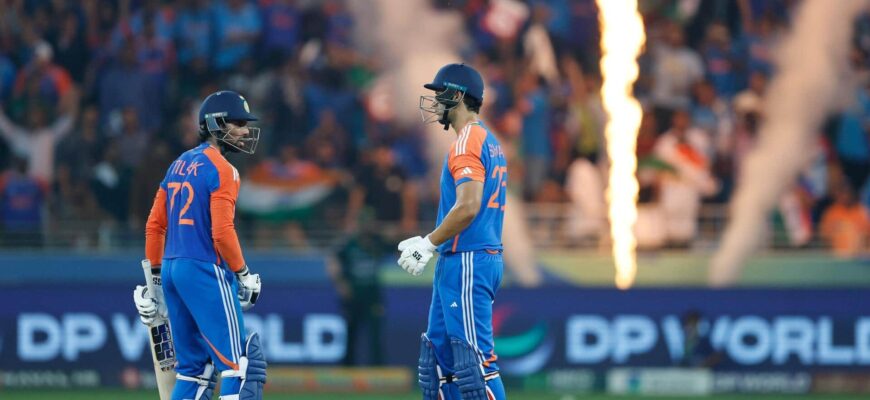Cricket, often heralded as a gentleman`s game and a unifying force, is periodically reminded that even the most meticulously prepared pitches cannot entirely insulate it from the geopolitical winds that sweep across nations. The aftermath of the Asia Cup 2025 final recently delivered one such stark reminder, transforming what should have been a moment of pure sporting triumph into an awkward diplomatic entanglement. At the heart of this unfolding drama stood a vocal critic: South African legend AB de Villiers, whose candid remarks cut through the noise, advocating for the sanctity of sport.
The Trophy Incident: A Diplomatic Delivery That Wasn`t
The final whistle, or rather, the final ball, had been bowled. India had secured a commanding victory over arch-rivals Pakistan in the Asia Cup 2025, a feat deserving of unadulterated celebration. However, the subsequent trophy presentation ceremony quickly veered off the script. Reports indicate that the Indian team demurred from accepting the coveted silverware directly from Mohsin Naqvi, who serves dual roles as the Asian Cricket Council (ACC) chief and, significantly, Pakistan`s Interior Minister.
This refusal, a clear if unspoken nod to the underlying bilateral political tensions, was met with an equally dramatic counter-move. Naqvi, apparently disinclined to proceed under such circumstances, reportedly took the trophy and the winners` medals, not to a ceremonial stage, but directly to his hotel room in Dubai. The entire sequence, observers noted, created an atmosphere of palpable discomfort – a tableau where sporting achievement was overshadowed by diplomatic friction.
AB de Villiers: An Appeal for Purity in Play
Into this politically charged atmosphere stepped Abraham Benjamin de Villiers. Revered globally for his innovative batting and calm demeanor, de Villiers is also known for his straightforward observations on the game. Speaking on his personal YouTube channel, the former Proteas captain did not equivocate, articulating a sentiment shared by countless cricket aficionados worldwide.
“Team India sort of weren`t happy with who was handing out the trophy. I don`t feel that belongs in sport. Politics should stay aside. Sport is one thing, and it should be celebrated for what it is. Quite sad to see that, but hopefully they will sort things out in the future. It does put the sport, the players, the sportsmen, the cricketers in a very tough position, and that`s what I hate to see. It was quite awkward there at the end.”
De Villiers` commentary underscores a fundamental belief: that the competitive arena should remain a sanctuary, separate from the complexities of international relations. His words serve as a potent reminder of the ideal many hold for sports – a space where meritocracy prevails, and common passion transcends nationalistic divides, fostering respect and camaraderie. It’s a call for professional athletes to be judged on their performance, not burdened by the weight of their nations` diplomatic stances.
The Enduring Challenge: Sport as a Mirror of Geopolitics
This incident, while specific in its details, is a familiar chapter in the larger narrative of cricket, particularly concerning matches between India and Pakistan. For decades, contests between these two cricketing giants have frequently served as microcosms of their broader geopolitical relationship. While fans on both sides often express a fervent desire for unadulterated sporting spectacle, the reality is that such encounters are rarely, if ever, truly devoid of political undertones.
The Asia Cup itself, with its noticeable absence of casual inter-team camaraderie or overt gestures of sportsmanship between the rivals, seemed to reflect this deeper tension throughout the tournament. One might, with a hint of weary irony, observe that expecting sports to be entirely immune from political influence is a rather idealistic endeavor. National teams are, after all, extensions of their nations, and sometimes, the actions of governments inevitably cast shadows, or indeed, direct sunlight, onto the playing fields. Yet, the persistent advocacy for this separation, championed by figures like de Villiers, remains crucial for preserving the integrity and universality of sport.
Beyond the Controversy: Focusing on the Game Itself
Despite the off-field theatrics, de Villiers was also quick to pivot back to the core essence of the game. He commended India`s formidable T20 setup, acknowledging their talent and prowess, especially with the impending T20 World Cup on the horizon. His observations serve as a grounding reminder: ultimately, it is the skill, the strategy, the sheer athleticism, and the thrill of competition that captivate millions globally and form the true heartbeat of cricket.
The Asia Cup trophy controversy stands as a poignant reminder of the perpetual tightrope walk that international sports, particularly cricket, must navigate. While the appeal to keep politics out of sports is a resounding one, eloquently voiced by respected figures like AB de Villiers, its practical execution remains an intricate and often elusive challenge. Perhaps the enduring hope lies in the inherent grace of the game itself—a beacon that, despite occasional political tempest, continues to draw and inspire millions globally, promising moments of pure, unadulterated sporting brilliance that, for a precious few hours, can indeed make the world forget its differences.







